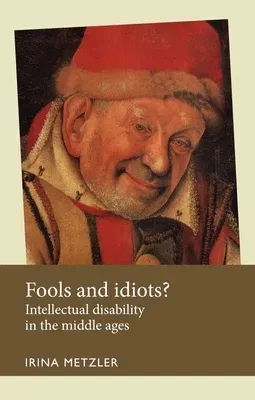Irina Metzler
(Author)Fools and Idiots?: Intellectual Disability in the Middle AgesPaperback, 6 March 2018

Qty
1
Turbo
Ships in 2 - 3 days
In Stock
Free Delivery
Cash on Delivery
15 Days
Free Returns
Secure Checkout

Part of Series
Disability History
Part of Series
Disability History Mup
Print Length
296 pages
Language
English
Publisher
Manchester University Press
Date Published
6 Mar 2018
ISBN-10
0719096375
ISBN-13
9780719096372
Description
Product Details
Author:
Book Format:
Paperback
Country of Origin:
US
Date Published:
6 March 2018
Dimensions:
21.59 x
13.97 x
1.37 cm
ISBN-10:
0719096375
ISBN-13:
9780719096372
Language:
English
Location:
Manchester
Pages:
296
Publisher:
Weight:
303.91 gm